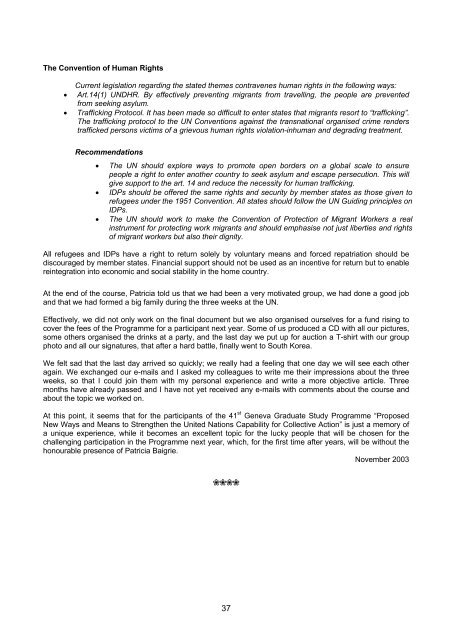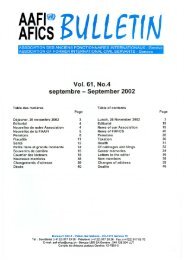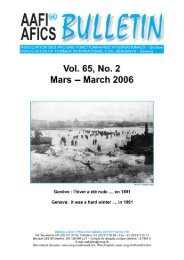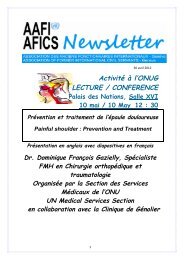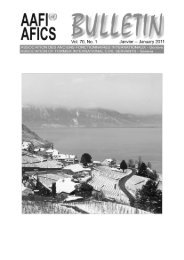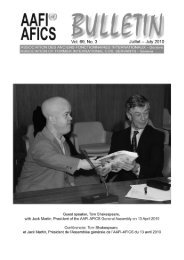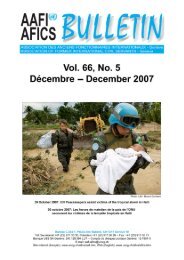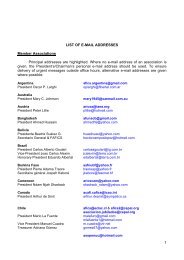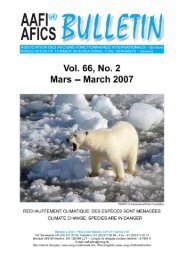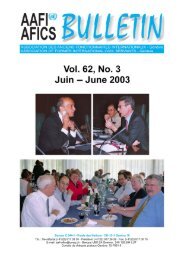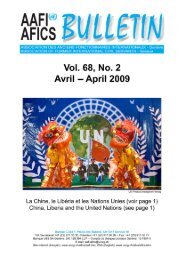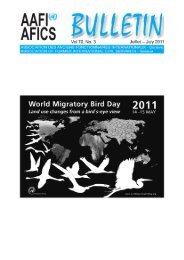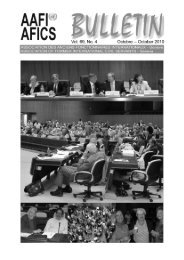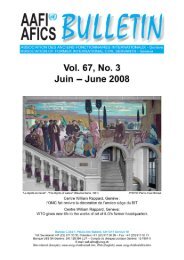nouvelles de notre association - aafi-afics - UNOG
nouvelles de notre association - aafi-afics - UNOG
nouvelles de notre association - aafi-afics - UNOG
You also want an ePaper? Increase the reach of your titles
YUMPU automatically turns print PDFs into web optimized ePapers that Google loves.
The Convention of Human Rights<br />
Current legislation regarding the stated themes contravenes human rights in the following ways:<br />
• Art.14(1) UNDHR. By effectively preventing migrants from travelling, the people are prevented<br />
from seeking asylum.<br />
• Trafficking Protocol. It has been ma<strong>de</strong> so difficult to enter states that migrants resort to “trafficking”.<br />
The trafficking protocol to the UN Conventions against the transnational organised crime ren<strong>de</strong>rs<br />
trafficked persons victims of a grievous human rights violation-inhuman and <strong>de</strong>grading treatment.<br />
Recommendations<br />
• The UN should explore ways to promote open bor<strong>de</strong>rs on a global scale to ensure<br />
people a right to enter another country to seek asylum and escape persecution. This will<br />
give support to the art. 14 and reduce the necessity for human trafficking.<br />
• IDPs should be offered the same rights and security by member states as those given to<br />
refugees un<strong>de</strong>r the 1951 Convention. All states should follow the UN Guiding principles on<br />
IDPs.<br />
• The UN should work to make the Convention of Protection of Migrant Workers a real<br />
instrument for protecting work migrants and should emphasise not just liberties and rights<br />
of migrant workers but also their dignity.<br />
All refugees and IDPs have a right to return solely by voluntary means and forced repatriation should be<br />
discouraged by member states. Financial support should not be used as an incentive for return but to enable<br />
reintegration into economic and social stability in the home country.<br />
At the end of the course, Patricia told us that we had been a very motivated group, we had done a good job<br />
and that we had formed a big family during the three weeks at the UN.<br />
Effectively, we did not only work on the final document but we also organised ourselves for a fund rising to<br />
cover the fees of the Programme for a participant next year. Some of us produced a CD with all our pictures,<br />
some others organised the drinks at a party, and the last day we put up for auction a T-shirt with our group<br />
photo and all our signatures, that after a hard battle, finally went to South Korea.<br />
We felt sad that the last day arrived so quickly; we really had a feeling that one day we will see each other<br />
again. We exchanged our e-mails and I asked my colleagues to write me their impressions about the three<br />
weeks, so that I could join them with my personal experience and write a more objective article. Three<br />
months have already passed and I have not yet received any e-mails with comments about the course and<br />
about the topic we worked on.<br />
At this point, it seems that for the participants of the 41 st Geneva Graduate Study Programme “Proposed<br />
New Ways and Means to Strengthen the United Nations Capability for Collective Action” is just a memory of<br />
a unique experience, while it becomes an excellent topic for the lucky people that will be chosen for the<br />
challenging participation in the Programme next year, which, for the first time after years, will be without the<br />
honourable presence of Patricia Baigrie.<br />
November 2003<br />
<br />
37


